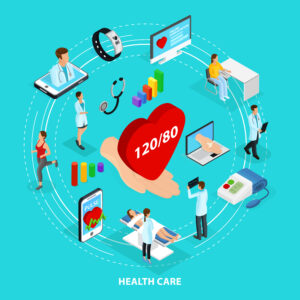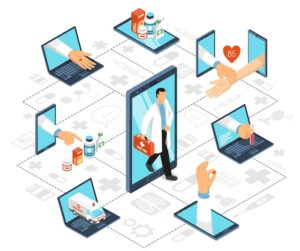The healthcare industry is evolving in many ways, but its marketing strategies often lag behind those of consumer-focused industries. Why does this happen? Strict HIPAA regulations and FDA constraints pose significant challenges to adopting innovative marketing techniques. Additionally, healthcare organizations prioritize patient care over marketing, which makes sense given the sector’s focus on well-being.
However, the landscape is shifting. A recent study revealed that 77% of patients conduct online research before booking an appointment. Another report showed that 93 million Americans—roughly 80% of internet users—search for health-related information online. These statistics underscore a crucial trend: patients increasingly depend on digital resources to make informed healthcare choices. This shift makes it essential for healthcare providers to adopt digital marketing to enhance patient engagement, improve care outcomes, and stay competitive.
What is Healthcare Digital Marketing?
Healthcare digital marketing involves leveraging online platforms and tools to promote services, educate patients, and foster long-term engagement. Historically, healthcare marketing relied on traditional channels like print ads, TV, radio, and direct mail. Once campaigns were launched, they couldn’t be adjusted in real time, limiting their adaptability.
Today, things are different. Modern healthcare consumers are proactive, tech-savvy, and selective about their choices. They extensively research online, read reviews, and compare providers before deciding. Digital marketing empowers healthcare providers to meet these evolving expectations through targeted, data-driven campaigns that genuinely resonate with patients.

The Role of Digital Marketing in Healthcare
As consumers increasingly seek speed, convenience, and transparency, online services play a crucial role. According to Becker’s Hospital Review, today’s patients expect two-way communication and meaningful online interactions with healthcare providers. Digital marketing is key to meeting these demands.
Key Benefits of Digital Marketing in Healthcare:
Enhanced Accessibility: Online platforms make it easier for patients to find and connect with providers.
Increased Patient Trust: A strong online presence, including educational content, builds credibility and trust.
Improved Patient Retention: Digital marketing enables personalized communication, making patients feel valued and informed.
6 Digital Marketing Strategies for Healthcare Providers
Optimize for Search (SEO)
Search engines are a critical gateway for patients. A Think With Google study found that search engines drive three times more visitors to hospital websites than any other source. Additionally, 44% of patients who research hospitals on mobile devices schedule an appointment afterward.
To make the most of this:
Incorporate relevant keywords like “medical digital marketing” and “health marketing.”
Optimize for local searches (e.g., “top clinics near me”).
Ensure your website is mobile-friendly and fast-loading.
2. Produce Video Content
Video marketing effectively captures attention and builds engagement. According to Eyeview Digital, videos on landing pages can boost conversions by up to 80%. In healthcare, videos can:
Break down complex medical procedures.
Share patient success stories.
Provide general wellness tips.
Although creating videos requires investment, their impact often surpasses that of text-based content in competitive digital spaces.
3. Engage via Social Media
Platforms like Facebook, Instagram, and LinkedIn are vital for building patient relationships. A study found that 57% of patients consider a provider’s social media presence when deciding to seek treatment. To optimize social media:
Share educational content, health tips, and updates.
Use paid campaigns to target specific demographics.
Interact with followers through comments and direct messages.

4. Create Personalized Campaigns
Healthcare is highly personal, and marketing should reflect that. A generic approach won’t resonate with most patients. Instead:
Use data from healthcare CRM tools to segment audiences.
Tailor messages to address individual patient needs.
Implement email campaigns that deliver valuable, targeted content.
5. Prioritize Analytics
One of digital marketing’s greatest strengths is its measurability. Key metrics to track include:
Website traffic and user behavior.
Conversion rates for online bookings.
Engagement on social media platforms.
Tools like Google Analytics and Hootsuite enable healthcare providers to refine strategies in real time while maintaining compliance with privacy regulations.
6. Update Your Email Strategy
Email remains one of the most effective tools for communication. To optimize email marketing:
Ensure emails are mobile-friendly, as nearly half are opened on phones.
Focus on educational content, such as wellness tips and symptom management.
Include clear calls-to-action, like scheduling an appointment or learning more about a service.

Challenges in Healthcare Digital Marketing
Despite its advantages, digital marketing in healthcare comes with challenges:
Regulatory Compliance: Adhering to HIPAA and data privacy laws is essential.
Budget Constraints: Allocating resources to marketing while balancing operational costs can be difficult.
Combating Misinformation: Providers must address inaccuracies to maintain trust and credibility.
Although these challenges exist, the benefits of digital marketing—better patient engagement and improved outcomes—make it a worthwhile investment.

Final Thoughts
Digital marketing has transformed the healthcare industry. By incorporating SEO, video content, social media, personalized campaigns, and analytics, healthcare providers can significantly improve patient experiences and drive long-term growth. As patients increasingly turn to online resources, digital marketing is no longer optional—it’s essential.
At Seven Fusions, we excel at creating customized healthcare marketing strategies. Whether you need an optimized website, effective ad campaigns, or dynamic social media management, our team is here to guide you toward digital success.
